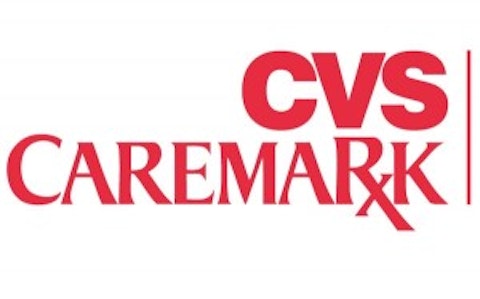
My only concern is that with shares trading just below their 52-week highs, I wonder whether or not they are still a good value or if they no longer make sense as a new investment. With CVS Caremark Corporation (NYSE:CVS) set to report earnings on Tuesday, August 6, now seems like a good time to take a look and see if CVS Caremark Corporation (NYSE:CVS) is still a good value, or if one of the alternatives would make a better investment.

The current state of CVS
As of the latest data available, CVS Caremark Corporation (NYSE:CVS) operated just under 7,600 stores in 45 states. The company filled almost 720 million prescriptions last year, which is a 21% share of the entire U.S. retail pharmacy market.
CVS Caremark Corporation (NYSE:CVS) sells a variety of products in its stores, but the majority comes from the pharmacy, which accounts for 69% of the company’s sales. An additional 11% of CVS Caremark Corporation (NYSE:CVS)’s sales come from over-the-counter medications and personal care products, so medical-related spending makes up 80% of the company’s revenue. While CVS does have many other products, such as cosmetics, photo services, and groceries, it would be fair to say that healthcare spending is crucial to the company’s bottom-line.
In good times and bad?
While it makes sense that CVS would do better than most retailers during a recession, let’s take a look to see how they actually fared during the most recent one. Looking at the company’s annual revenue from 2007-present, we see that the only drop in sales was a very slight one between 2009 and 2010. Since then, shares have increased to a level well beyond the company’s pre-recession numbers. CVS also raised its dividend every single year during that period of time and also continued share buybacks, lowering the outstanding share count every year.

The numbers and future growth
Looking ahead, CVS should experience moderate sales growth for the rest of this year, and is projecting $400 million in new pharmacy benefit management (PBM) sales, as well as about 1.4% retail sales growth. The time to really watch CVS’s numbers will be after January 1, 2014, when the amount of insured consumers is expected to rise significantly as a result of the Affordable Care Act. Since payments from members of prescription drug plans accounted for 98% of CVS’s pharmacy sales last year, I’d say that this is indeed a very big deal to the company.
Currently, shares trade for 15.3 times this year’s expected earnings of $3.98 per share, which looks pretty good considering the amount of growth projected for the coming years. As a result of the increased pharmacy business mentioned above, earnings are projected to rise to $4.45 and $5.00 in 2014 and 2015, respectively, for annual growth of 11.8% and 12.4%. Before we go diving in, let’s see how this stacks up to the alternative plays in the sector.
Alternative plays: Walgreen and Express Scripts
Walgreen Company (NYSE:WAG) is often mentioned alongside CVS, and is very close in both size and range of products offered. Walgreen Company (NYSE:WAG)’s pharmacy business is actually a bit larger, having filled 784 million prescriptions last year at its 8,400 locations in all 50 states. While Walgreen Company (NYSE:WAG) is projected to have similar growth as CVS in the coming years, its valuation looks a little higher at the present time, currently trading for 16 times earnings.
The company’s revenue actually has dropped a bit since 2011 with their PBM contract with Express Scripts Holding Company (NASDAQ:ESRX) expiring, which caused customers covered by their plans to go elsewhere for their prescriptions. Although the companies resolved the situation and Walgreen Company (NYSE:WAG) is again part of Express Scripts Holding Company (NASDAQ:ESRX)’s network, not all of the lost customers have returned, and the full extent of lost revenues because of the situation remains unknown.
Speaking of Express Scripts Holding Company (NASDAQ:ESRX), the PBM giant also deserves a look as a viable alternative in this sector. The company has grown its revenues rapidly over the last few years and recently acquired Medco Health Solutions, which effectively doubled the company’s annual sales. Express Scripts Holding Company (NASDAQ:ESRX) trades for 15.1 times this year’s expected earnings, the lowest valuation of the three. Additionally, the company is projected to grow its earnings by 15.1% and 13.7% in 2014 and 2015, respectively, also the best of the three. However, consider that 100% of this company’s revenue is dependent on one source (PBM), and this creates an added risk.
Final thoughts
While all three of these companies would make an excellent addition to your portfolio, I prefer CVS for its leading position, good valuation, and ambitious growth strategy. The company also has an excellent record of creating value for its shareholders through both dividend increases and share buybacks, and with a payout ratio of below 20%, CVS should have no problem keeping up its increases in the future.
The article What Is the Best Play on Retail Pharmacies? originally appeared on Fool.com and is written by Matthew Frankel.
Matthew Frankel has no position in any stocks mentioned. The Motley Fool recommends Express Scripts. The Motley Fool owns shares of Express Scripts. Matthew is a member of The Motley Fool Blog Network — entries represent the personal opinion of the blogger and are not formally edited.
Copyright © 1995 – 2013 The Motley Fool, LLC. All rights reserved. The Motley Fool has a disclosure policy.




